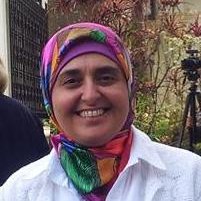Prof. Dr. Masun Nabhan Homsi
Contact
Scientist
under the supervision:
Helmholtz Centre for Environmental Research - UFZ
Permoserstr. 15, 04318 Leipzig, Germany
Phone +49 341 235-1275

Scientific Career
03/2020 present
Scientist
Department of Molecular Systems Biology, Helmholtz Center for Environmental Research - UFZ, Leipzig, Germany
04/2017 09/2020
Associate Professor- Computer Science and Information Technology Department at Simon Bolivar University, Caracas, Venezuela.
Assistant Professor - Computer Science and Information Technology Department at Simon Bolivar University, Caracas, Venezuela.
Lecturer - Computer Engineering Department, Alshahba University, Aleppo – Syria.
Education
PhD
2011
Informatics
Mathematics and Informatics Department, Faculty of Science, University of Aleppo, Syria.
MSc
2002
Informatics
1997
Informatics
1993
Informatics
Research interests
My research is in the areas of machine learning, deep learning, text and metagenome mining.
Prior to joining the UFZ, I was working as associate professor of Data Mining, Artificial Intelligence and Algorithms and Programming at Computer Science and Information Technology Department of Simon Bolivar University, Caracas- Venezuela, where I directed many researches focused on extracting actionable information from medical data, such as patient information, medical record, examination data, laboratory tests and biosignals readings: phonocardiogram (PCG), photoplethysmogram (PPG), electrocardiology (EKG), electroencephalography (EEG), electrooculography (EOG), electromyography (EMG) and oxygen saturation (SaO2).
Publications
- Farag, M. A., von Bergen, M., Saleh, B. M., Homsi, M. N., & Abd El-Al, M. S. (2021). How do green and black coffee brews and bioactive interaction with gut microbiome affect its health outcomes? Mining evidence from mechanistic studies, metagenomics and clinical trials. Trends in Food Science & Technology, 118, 920-937.
- Sallam, I. E., Abdelwareth, A., Attia, H., Aziz, R. K., Homsi, M. N., von Bergen, M., & Farag, M. A. (2021). Effect of Gut Microbiota Biotransformation on Dietary Tannins and Human Health Implications. Microorganisms, 9(5), 965.
- Warrick, P. A., Lostanlen, V., Eickenberg, M., Homsi, M. N., Rodríguez, A. C., & Andén, J. (2021, September). Arrhythmia Classification of Reduced-Lead Electrocardiograms by Scattering-Recurrent Networks. In 2021 Computing in Cardiology (CinC) (Vol. 48, pp. 1-4). IEEE.
- Lovera, F. A., Cardinale, Y. C., & Homsi, M. N. (2021). Sentiment Analysis in Twitter Based on Knowledge Graph and Deep Learning Classification. Electronics, 10(22), 2739.
- Lovera, F. A., Cardinale, Y., Buscaldi, D., Charnois, T., & Homsi, M. N. (2021). Deep Learning Enhanced with Graph Knowledge for Sentiment Analysis, X-SENTIMENT 6th International Workshop held at ESWC on eXplainable SENTIment Mining and EmotioN deTection, June, 2021.
- Ismail, W. S. & Homsi, M. N. (2021). Recent Advances and Challenges of Arabic Why Question Answering Systems, ArabWIC 2021: ArabWIC 7th International Conference on Arab Women in Computing.
- Warrick, P. A., Lostanlen, V., Eickenberg, M., Andén, J., & Homsi, M. N. (2020, September). Arrhythmia Classification of 12-lead Electrocardiograms by Hybrid Scattering-LSTM Networks. In 2020 Computing in Cardiology (pp. 1-4). IEEE.
- Warrick, P. A., Lostanlen, V., & Homsi, M. N. (2019). Hybrid scattering-LSTM networks for automated detection of sleep arousals. Physiological measurement, 40(7), 074001.
- Warrick, P. A., & Homsi, M. N. (2018). Ensembling convolutional and long short-term memory networks for electrocardiogram arrhythmia detection. Physiological measurement, 39(11), 114002.
- Warrick, P., & Homsi, M. N. (2018, September). Sleep arousal detection from polysomnography using the scattering transform and recurrent neural networks. In 2018 Computing in Cardiology Conference (CinC) (Vol. 45, pp. 1-4). IEEE.
- Ismail, W. S., & Homsi, M. N. (2018). Dawqas: A dataset for arabic why question answering system. Procedia computer science, 142, 123-131.
- Tur, G., & Homsi, M. N. (2017, September). Cost-sensitive classifier for spam detection on news media Twitter accounts. In 2017 XLIII Latin American Computer Conference (CLEI) (pp. 1-6). IEEE.
- Warrick, P., & Homsi, M. N. (2017, September). Cardiac arrhythmia detection from ECG combining convolutional and long short-term memory networks. In 2017 Computing in Cardiology (CinC) (pp. 1-4). IEEE.
- Homsi, M. N., & Warrick, P. (2017). Ensemble methods with outliers for phonocardiogram classification. Physiological measurement, 38(8), 1631.
- Homsi, M. N., et al, (2016, September). Automatic heart sound recording classification using a nested set of ensemble algorithms. In 2016 Computing in Cardiology Conference (CinC) (pp. 817-820). IEEE.
- Delgado, J. A., Altuve, M., & Homsi, M. N. (2015, December). Detection of segments with fetal QRS complex from abdominal maternal ECG recordings using support vector machine. In 11th International Symposium on Medical Information Processing and Analysis (Vol. 9681, p. 96811A). International Society for Optics and Photonics.
- Delgado, J. A., Altuve, M., & Homsi, M. N. (2015, September). Haar wavelet transform and principal component analysis for fetal QRS classification from abdominal maternal ECG recordings. In 2015 20th Symposium on Signal Processing, Images and Computer Vision (STSIVA) (pp. 1-6). IEEE.
- Homsi, M. N. (2014). Multi-class sentiment analysis using a hierarchical logistic model tree approach. Maskana, 5.
